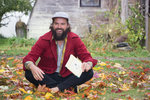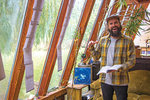Although the writings of Walt Whitman are well over a century old, his worldview is timeless and relevant in 21st century America, says Dillon Porter, who sets out to prove it with a stage production built on Whitman’s poetry.
This item is available in full to subscribers.
We have recently launched a new and improved website. To continue reading, you will need to either log into your subscriber account, or purchase a new subscription.
If you had an active account on our previous website, then you have an account here. Simply reset your password to regain access to your account.
If you did not have an account on our previous website, but are a current print subscriber, click here to set up your website account.
Otherwise, click here to view your options for subscribing.
* Having trouble? Call our circulation department at 360-385-2900, or email our support.
Please log in to continue |
|


Although the writings of Walt Whitman are well over a century old, his worldview is timeless and relevant in 21st century America, says Dillon Porter, who sets out to prove it with a stage production built on Whitman’s poetry.
Porter will take the stage of the Chameleon Theater this week for a solo performance of “Walt Whitman, 200 Years: A Birthday Celebration,” which will include selections from “Song of Myself.”
“Whitman’s view of America for me is a reminder we are made of the same stuff and we have more that unites us than separates us,” he said. “That thing that does unite us is our connection to nature.”
Porter, 37, is an actor, director and producer who has been in several leading roles in New York theatre productions and on film, including as co-star of the 2015 movie “Bastards y Diablos” featuring Andrew Perez. He just wrapped a production of Shakespeare’s “A Midsummer Night’s Dream” at Club Yes in Brooklyn. He also performed the title role in director Marc Weinblatt’s adaptation of “Hamlet” for Key City Public Theatre’s 14th annual Shakespeare in the Park, a performance which earned him high praise from critic Jason Serinus who said of the performance, “‘Brilliance’ is not a descriptor to be dispensed lightly, but in the case of Dillon Porter’s remarkable portrayal of Hamlet, only ‘brilliant’ will do.”
The Whitman production is directed by Rose Burt.
“Rose is helping to give a framework of how I launch into the recitation, so it will not be just a faithful recitation of ‘Song of Myself,’ and it won’t be the entirety.”
The pieces are selected to ensure the production remains lively, which matches Porter’s effervescent and sometimes intense stage presence.
“Some of Whitman’s work is a litany, a list that will be good to put you to bed, for sure,” Porter said. “My intention is not to bore. If you feel like you nod off during some theater, you won’t. I will not let you fall asleep. That is where the raw, the dangerous, the corporeal, the effusive come in.”
Whitman writes with a lot of exclamation points, Porter said, which matches his own acting proclivities.
“He would go down to the shore in Red Hook, Brooklyn and he would read his poems into the waves because the waves would drown out his voice. He was not thought crazy by his neighbors for screaming in his room. He would take it to his beach.”
Porter, emulating Whitman, often visits the beaches at Fort Worden to practice his lines on the crashing surf.
“Sometimes I am the only one on that beach and I undress and jump into the water and feel the closest to Whitman ever,” Porter said.
Porter’s upcoming performances will also include a bit of movement, he said.
“There are moments that feel they might approach choreography, but it is pretty much pedestrian movement. I don’t think you will get to see a rond de jambe. But, it might feel like dancing. I have been exploring with it.”
Burt, Porter said, has urged him to pull back and find more moments of stillness, “so I can let the words land. It is really good to have a set of eyes on the work I trust who can tell me honestly when I begin to look foolish.”
Coming alive in Port Townsend
Porter, 37, an Oregon native who recently relocated to Port Townsend after a decade in theatre in New York City, said he is having a hard time keeping faith in the current political climate.
“It is hard to trust. I find myself with no trust, and without trust then you have no faith, and without faith you have a tough time getting up in the morning.”
Even though Whitman experienced the harsh realities of the Civil War, the writer was able to keep his faith by absorbing his surroundings and channeling it through his writing, Porter said.
“Where I resonate with Whitman is he wanted to absorb everybody and like a sponge squeeze it all out into his poems and then have it be read again. By transfiguring it through his poetry, (readers) can absorb Walt. In the exchange, I think he found his purpose. That feels like mine as well.”
Porter looks to Whitman’s time working as a nurse in Washington D.C. in Army field hospitals as a case in point for not hiding away from the brutal realities of life, but instead embracing that reality and coping with it through art.
“Even though we are in dark times, Whitman was writing in one of the darkest times, brothers killing brothers. You look at the battle of Gettysburg in Pennsylvania and all of the ghosts that haunt that. To not tune in to those ghosts that haunt the psyche of American democracy is a shortcoming.”
Simply stated, to not study history — both of an individual and of humanity as a whole — dooms a person to repeat past mistakes, Porter said. “I think it is really important to acknowledge the past. I don’t want to live there, but I don’t want to be cut off from whence I came.”
“Things are cyclical. Things come up again that I thought I had dealt with seven years ago. If I remember and go back seven years ago, how can I make a different choice now?”
Such change and growth might cause pain but is a necessary part of the human condition, Porter said.
“I might have to admit I have made mistakes. I might have to admit to myself that I have regrets. I might have to admit I have transgressed against someone’s sovereignty. To say that ‘I am sorry,’ acknowledging that historically is the first place to start.”
Privileged white male
Channeling Whitman, Porter wants to be all inclusive of thoughts, ideas, races, genders and identities.
“In the current climate, I am just a privileged white dude,” Porter said. “Not that nobody wants to hear what I have to say, but it is just so obvious I have been on the microphone for such a long time, or at least people that look and sound like me.”
That doesn’t mean living in silence, Porter said.
“I don’t want to be silent for fear of, ‘What if nobody likes what I have to say,’ but be more conscious of what I am saying. If I stop singing, then my voice drops out of the harmony. I don’t have to be the lead singer, but if I am going to be in the band of life, I want to do the doo-wop, snapping my fingers and doing my two step right behind whoever is singing.”
The key is to find the balancing point between self-empowerment and empowering others, Porter said.
“To have privilege and be ashamed of it makes you small. But to ask, ‘What am I going to do with all of this privilege?’ is one I ask myself more often in Port Townsend.”
Escaping the ‘concrete jungle’
Port Townsend has offered Porter a refuge from the hustle and bustle of the Big Apple.
In late 2007, Porter was a cast member for the Broadway production of “The Ritz” starring Rosie Perez.
“Rosie is great,” Porter said. “She is funnier in real life than she is on stage. She had a lot of good stories.”
While in New York, Porter worked at Lincoln Center and in other venues, he said, rubbing elbows with a constant flow of famous actors.
“They are lovely, mostly,” Porter said. “They live a pretty charmed life.”
Porter said he would rather be in Port Townsend than in a huge metropolis.
“I really think time and space in one’s own life to cultivate art is necessary. It is really hard to have a day job and be an artist.”
Artists need time to gestate, nest, be quiet and still, Porter said.
“In that alchemy lays the potency. I would rather be penniless and living in my car here in Port Townsend than hustling, making a bunch of money and spending a bunch of money in New York.”
And, Porter can reconnect with nature, which, according to his interpretation of Whitman’s works, unites all.
Porter currently lives in a converted conservatory on a farm just outside of Port Townsend.
“We are all a part of this nature, and nature has nothing more than an urge for itself. Life wants to procreate more life. All goes onward and outward and nothing collapses. The principle of nature is abundance and variety, that death is as much a part of life as birth and sexual desire and that love and sympathy are among the deepest ways that the human imagination connects people to one another.”